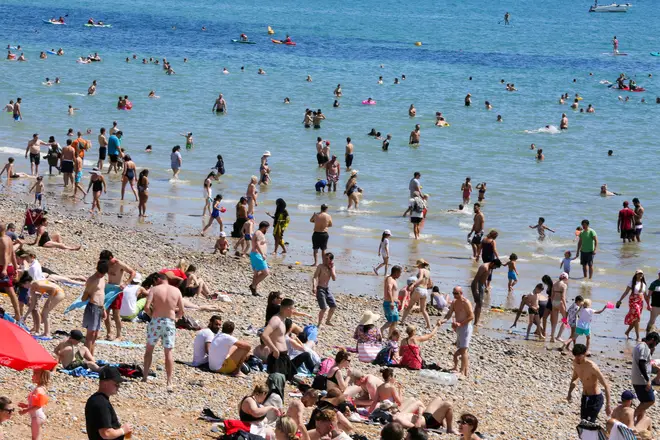'National heatwave emergency' could be declared in UK this week
13 July 2022, 07:22 | Updated: 13 July 2022, 07:25

The Met Office Explain Exactly What A UK Heatwave Is
What is a national heatwave emergency and what does it mean? Here's what we know about the weather this week...
With temperatures in the UK continuing to rise over the next few days, a level four heatwave could be declared.
Earlier this week, the Met Office issued an extreme heat warning for England and Wales’, posing a potential risk to life, and this will stay in place until Monday evening.
But with temperatures hitting the late 30s by Sunday, there is a 30% chance of Brits seeing the hottest day on record ever.
The current hottest temperature is 38.7C which was measured in Cambridge back in 2019.
- Sleeping naked will actually make you hotter at night, expert claims
- Holiday hotspot in Italy bans bikinis with £425 fine
- This is how much it costs to leave your fan on all night

This means parts of the country could be given a Level 4 heat-health alert, which has only been issued twice before now, warns of 'potential serious illness or danger to life'.
According to reports, the government called a COBRA meeting on Monday to discuss whether to officially label the hot weather a national emergency and put plans in place to keep people safe.
If this were to happen, it would mean "illness and death occurring among the fit and healthy - and not just in high-risk groups".
The UK Health Security Agency told The Telegraph: “There’s a possibility of a level four heatwave. If it gets above 104F (40C), then it is likely to be a level four heatwave for the first time.”

Met Office Deputy Chief Meteorologist Rebekah Sherwin said: "Some models have been producing maximum temperatures in excess of 40C in parts of the UK over the coming weekend and beyond.
"At longer time scales temperature forecasts become less reliable, so whilst these figures can’t be ruled out, they are still only a low probability."
"A number of weather scenarios are still possible and at the current time, mid- or perhaps high-30s are looking more likely."
If temperatures get too high, there could be a serious impact on things such as roads, schools and water supplies.
Road surfaces and train tracks could melt causing traffic chaos, whole schools and offices may be deemed ‘unsafe’ and forced to close.
Rising temperatures could also put pressure on energy supplies as people begin to use air-conditioning units and fans, while there have also been warnings of water shortages.























